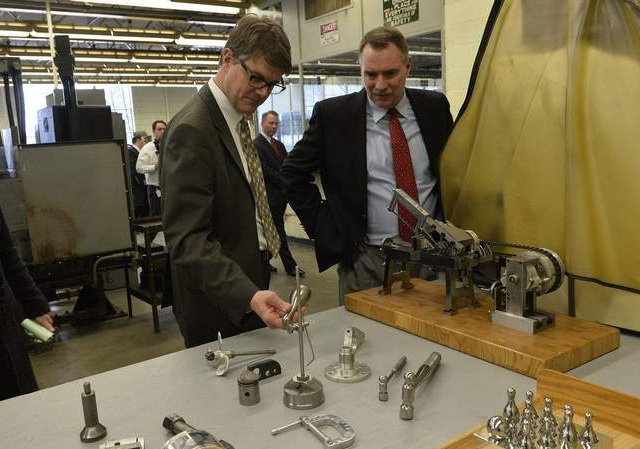January 12, 2014
![]() LANSING — New legislation in Lansing is designed to help inmates find a job when they leave prison.
LANSING — New legislation in Lansing is designed to help inmates find a job when they leave prison.
The bills would let Michigan certify felons’ skills and character to help them during the job application process. The “certificate of employability” could go to parolees based on their criminal history, institutional behavioral record, and vocational and educational training.
Republicans and a Democrat launched the initiative last week alongside business leaders and ex-felons at an Ionia prison. Lawmakers hope to encourage the business community to give parolees a chance because they might end up behind bars again without a job.
The legislation would let businesses use the certificate as evidence of due care in hiring and give them immunity in lawsuits alleging negligent hiring. Sponsors of the bills are hoping for a hearing within weeks.

State Rep. Joe Haveman and Andy Ribbens, president of Premier Finishing in Grand Rapids, look over some of the products created by prisoners in the machines shop at the Richard Handlon Correctional Facility. A press conference was held at the facility Wednesday to discuss bills aimed at reducing the state’s 78-percent employment rate for parolees.
Lawmakers: Decrease recidivism by hiring parolees
![]() Bills would provide offenders with ‘certificate of employability,’ employers with reduced liability
Bills would provide offenders with ‘certificate of employability,’ employers with reduced liability
By Karen Bota
karen.bota@sentinel-standard.com
Posted Jan. 9, 2014 @ 9:33 pm
IONIA, Mich.
The woodworking shop at the Richard Handlon Correctional Facility on Bluewater Highway was more crowded than usual Wednesday, as state lawmakers, Michigan Department of Corrections staff, Grand Rapids area business representatives and former prisoners gathered for a press conference to discuss efforts to reduce the state’s 78 percent unemployment rate for parolees.
Addressing corrections issues is something the current state legislature takes seriously, said State Rep. Lisa Posthumus Lyons, R-Alto. Michigan has a “fairly low” recidivism rate of 31 percent, which is already low compared with national standards, she said, and legislators want to reduce it even further.
“Studies have shown when parolees re-enter society after a stay in prison, if they have a steady job, if they are employed and going to work every day, they’re much less likely to become repeat offenders and end up back in the corrections system,” Lyons said. “It’s one of those issues where we want to make sure everybody has the opportunity for a job, but when it comes to the corrections system, we believe that if parolees have the opportunity for a job, it reduces the risk of their recidivism and, we hope, will make our communities safer, as well as lessen the burden on the corrections system and taxpayers.”
Facilities like Handlon have “great programs to teach labor skills that are highly marketable,” Lyons said. What is needed is a way to take those skilled but unemployed parolees and match them with jobs.
The package of bills unveiled during the press conference, House Bills 5216-18, would give the Department of Corrections the ability to ensure offenders leave prison with a “certificate of employability,” which showcases the skills learned during their sentence and requires licensing boards to consider the certificate if they consider an offender’s criminal record during the hiring process.
The bills also stipulate that employers who hire parolees in good faith based on their certification will have reduced liability for tort claims based upon negligent hiring.
“We’ve introduced the passage of bills to help encourage employees to seek out parolees for some of their job openings,” said Lyons.
 The certificate of employability tells a potential employer that the parolee is a “suitable candidate” for employment and that the Department of Corrections believes he is employable and a law-abiding citizen upon re-entry into society, Lyons said. “It gives employers the comfort to know these people have been working to hone a trade, a craft or a skill, and allows employers to know if they hire someone with a certificate, it will help mitigate liability issues and provide immunity from claims based on hiring an individual who is a parolee.”
The certificate of employability tells a potential employer that the parolee is a “suitable candidate” for employment and that the Department of Corrections believes he is employable and a law-abiding citizen upon re-entry into society, Lyons said. “It gives employers the comfort to know these people have been working to hone a trade, a craft or a skill, and allows employers to know if they hire someone with a certificate, it will help mitigate liability issues and provide immunity from claims based on hiring an individual who is a parolee.”
The Department of Corrections can revoke certification if the prisoner has any misconduct before being released or commits a subsequent crime after release, she added.
Representatives from Cascade Engineering and Butterball Farms, both of Grand Rapids, spoke at Wednesday’s press conference about their positive outcomes in hiring parolees – graduates of the Handlon facility’s vocational education training programs – who have left prison ready and willing to work, with impressive skill sets and character traits.
Read more: http://www.sentinel-standard.com/article/20140109/NEWS/140109227#ixzz2qBjsEltW
Bills and Sponsors
HB 5216 at Parolees jobs 2014-HIB-5216: Corrections; parole; issuance by department of corrections of certificate of employability to certain prisoners; allow. Amends 1953 PA 232 (MCL 791.201– 791.285) by adding sec. 34d.
- Klint Kesto – (primary)Joe Haveman, Mike Shirkey, Rose Mary C. Robinson, John J. Walsh
HB 5217 at Parolees jobs 2014-HIB-5217: Labor; other; limited liability for employers that employ individuals issued a certificate of employability; provide for. Amends 1961 PA 236 (MCL 600.101 – 600.9947) by adding sec. 2956a.
HB 5218 at Parolees jobs 2014-HIB-5218: Occupations; individual licensing and regulation; prerequisite of “good moral character”; eliminate for occupational licensing purposes. Amends sec. 2 of 1974 PA 381 (MCL 338.42).
All bills have been referred to the House Committee on Commerce. No hearing yet scheduled. To be notified of date of hearing on these bills, sign up at:
http://www.legislature.mi.gov/(Ssla45fncn5xrp5buqfkighjf))/mileg.aspx?page=listserverSignup.
Related article on State Rep. Rose Mary Robinson at http://www.detroitnews.com/section/OPINION0304








